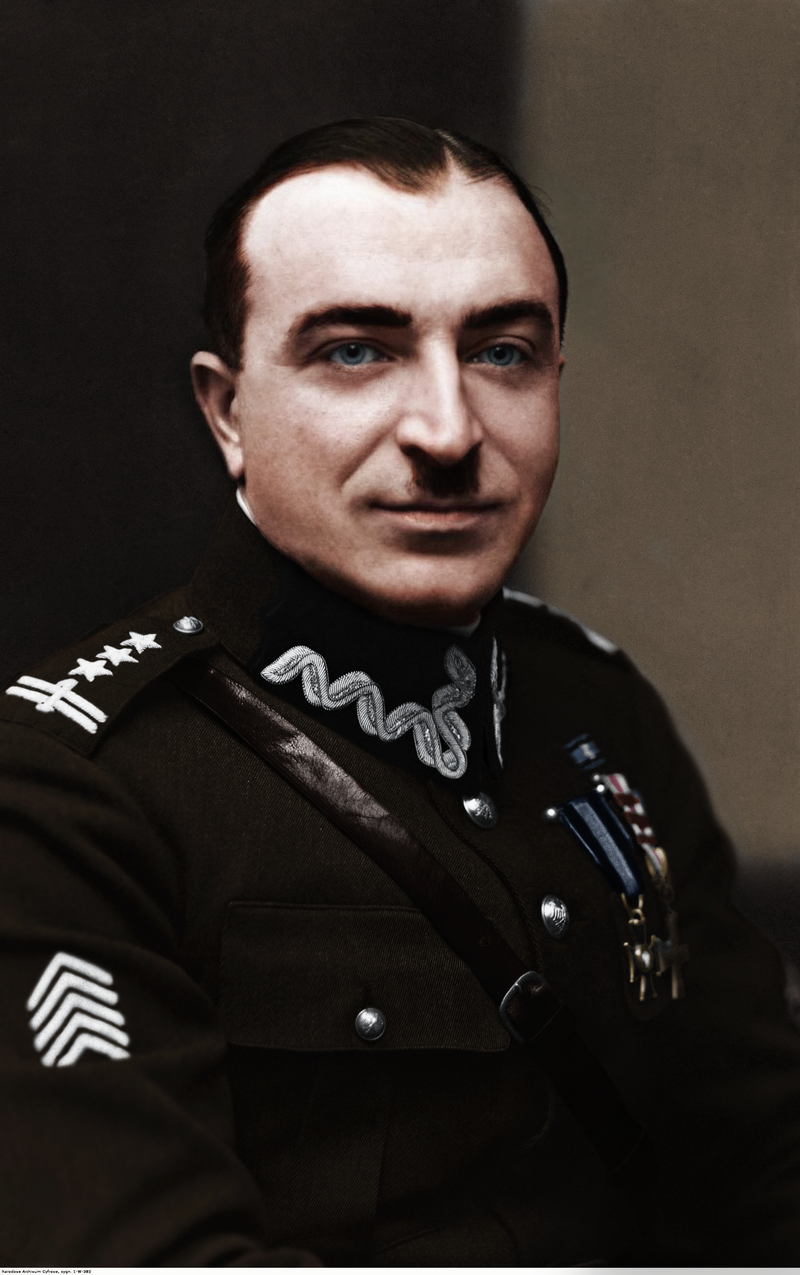He came from a family with Austrian-Jewish roots. Wilhelm Orlik – Rückeman commanded a tank regiment during the Polish-Bolshevik war, and just before the outbreak of World War II he was appointed commander of the Border Protection Corps. He fought fierce battles with the Soviet army after 17 September 1939. After the war, he settled permanently in Canada.
Wilhelm Orlik-Rückemann was born on 1 August 1894 in Lwów (today’s Lviv). He came from a family with Jewish-Austrian roots. During his secondary school education, he was the organiser of a scout troop in his home city. After passing his secondary school-leaving examinations in 1912, he began studying at the Lwów Polytechnic, which he combined with active participation in the Rifle Squads.
After the outbreak of the First World War, he joined the Polish Legions. He was wounded in the Battle of Laski on 26 October 1914. In 1915, he was promoted to lieutenant. From 1917, after the oath crisis, he served in the Austrian Army. In November 1918, he joined the ranks of the nascent Polish Army. During fighting with the Ukrainians at the end of November 1918, Wilhelm was taken prisoner, from where he was released in June 1919. On his return, he was promoted to the rank of captain and appointed deputy commander of the reserve battalion of the 6th Legion infantry regiment, and later commander of that regiment. In the Polish-Bolshevik War, he commanded the 132nd Infantry Regiment, and during the Battle of Warsaw he took command of the 1st Tank Regiment. Promoted to lieutenant colonel in 1920, he received further training at courses in France and served as head of the armoured weapons division of the Engineering Department of the Ministry of Military Affairs. In 1924, he married Róża Wanda Fajans, who came from a well-known Jewish family in Warsaw. A year later, their son Kazimierz Jerzy was born.
From 1932 to 1938, he was commander of the 9th Infantry Division, whose headquarters were stationed in Siedlce. In 1933, he was promoted to the rank of Brigadier-General. In December 1938, he became deputy commander of the Border Protection Corps (KOP), and on the eve of the outbreak of WWII – on 31 August 1939 Wilhelm was appointed commander of the KOP.
After Poland was attacked by Germany on September 1, 1939, and by the Soviet Union on September 17, 1939, KOP soldiers subordinate to him heroically took part in battles against the invaders. A fortress company commanded by Tadeusz Semik defended Węgierska Górka, in Silesia. Between 7 and 10 September, the Battle of Wizna was held, in which Polish troops (about 700 soldiers), commanded by Captain Władysław Raginis, a KOP officer, repulsed for 2 days the attacks of the overwhelming German army (about 40,000 soldiers) commanded by General Heinz Guderian. After the Soviet Union’s aggression against Poland on 17 September 1939, the invaders were confronted mainly by KOP troops, trying to delay the aggressor’s march as much as possible. The KOP forces were grouped by General Wilhelm Orlik-Rückemann, who decided to head towards Wlodawa. A grouping of nearly 9,000 soldiers fought a victorious battle of Shatsk on 29-30 September 1939, causing heavy losses to the Soviet 52nd Rifle Division.
After crossing the Bug River and marching towards Parczew, the last battle between KOP and Soviet units took place near Wytycze on October 1. After the battle, General Orlik-Rückemann disbanded the grouping, and some KOP squads joined General Franciszek Kleeberg’s Independent Operational Group and took part in the Battle of Kock against the Germans.
Wilhelm Orlik-Rückemann ordered Major Bolesław Studziński to organise an underground structure in Wlodawa. Its name would have referred to the KOP. The decision was made to establish the Polish Defenders Command (KOP). The organisation was to be based on the Polish Military Organisation that existed during the First World War. Orlik-Rückemann donated the rest of his KOP Command funds to it. He himself made his way to Warsaw, where he organised the editorial board of the underground magazine “Poland Lives”.
In Warsaw, Orlik-Rückemann contacted General Michał Karaszewicz-Tokarzewski, the commander of the underground Service for Poland’s Victory, which led to the subordination of the KOP to him. In October 1939, General Wilhelm Orlik-Rückemann reached Great Britain and then France via Lithuania and Sweden. Until the end of the war, however, he did not receive a service assignment (he remained at the disposal of the Commander-in-Chief).
From 1945 to 1947, he served in the General Inspectorate of the Polish Resettlement Corps. In the UK, he was joined by his family. Demobilised in 1947, he settled in London. Here, to support himself, Wilhelm worked as a watchmaker and later completed a confectionery course and found employment in a biscuit factory. After his wife died in 1971, he moved to join his son in Canada, who was a well-known specialist working in the aerospace industry. There, General Wilhelm Orlik- Rückemann became actively involved in the Polish Veterans Association.
He died on 18 October 1986 in Ottawa and was buried there in Notre-Dame Cemetery. He was decorated with the Silver Cross of the Military Order of Virtuti Militari, the Commander’s Cross of the Order of Polonia Restituta, the Cross of Independence, the Cross of Valour – four times, the Golden Cross of Merit, and the Officer’s Cross of the Legion of Honour (France).
Gen. Wilhelm Orlik- Rückemann became the patron of the Border Protection Specialised Training Centre in Lubań and the 19th Bug River Brigade of Territorial Defence in Chełm.





